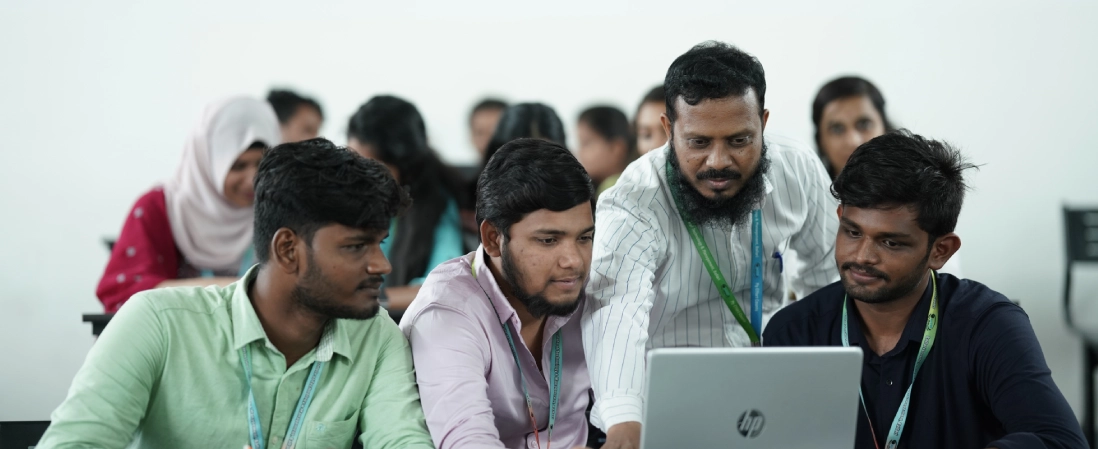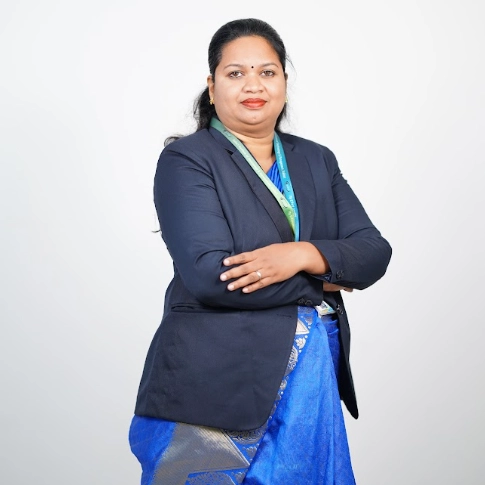Programme Level
Post Graduate
Duration
2 Years
About the Programme
Program Overview
The Master of Computer Applications (MCA) program at Ballari Institute of technology & Management, is a specialized postgraduate course designed to equip students with advanced knowledge and skills in computer science, software development, and information technology. Our program emphasizes a blend of theoretical foundations, practical applications, and industry-relevant skills, preparing graduates to excel in diverse and high-demand roles within the tech industry.
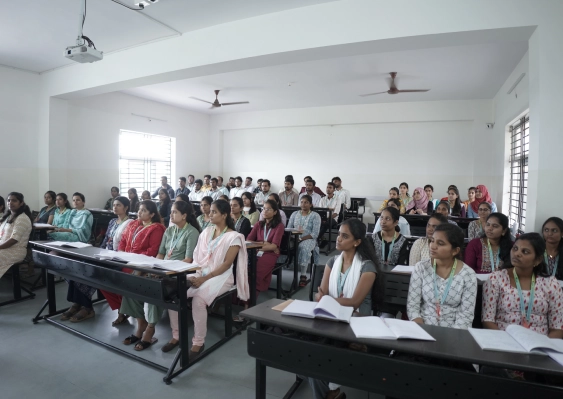
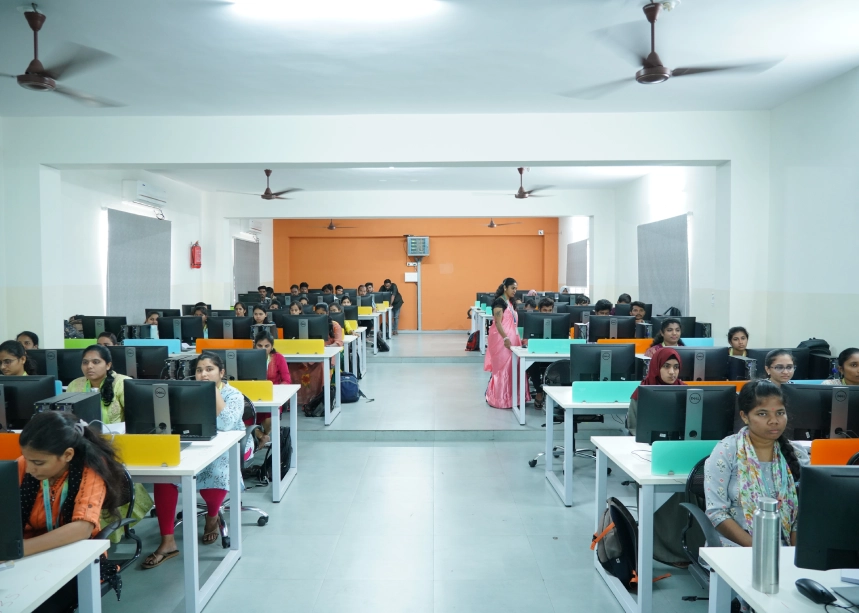
Our curriculum covers a wide range of topics, including advanced programming, data structures, software engineering, data science, artificial intelligence, machine learning, cloud computing, and cybersecurity. We regularly update our syllabus to align with the latest industry trends and technological advancements.
The MCA program emphasizes experiential learning through lab sessions, case studies, workshops, and live projects. Students work on real-world problems, gaining practical exposure that enhances their problem-solving abilities and technical skills. We encourage students to engage in research and innovation, providing access to resources and mentorship to explore areas of interest.
Our department actively supports projects that tackle contemporary challenges in computing and technology. Our faculty members bring a wealth of expertise from both academia and industry, ensuring students gain insights into theoretical concepts as well as real-world applications. They are dedicated to mentoring and guiding students in their academic and professional journeys.
In addition to technical expertise, the program focuses on developing essential soft skills, such as communication, teamwork, and project management. Workshops and seminars with industry experts provide insights into workplace dynamics, entrepreneurship, and career advancement. We have an active placement cell that assists students in securing internships and job placements with top-tier organizations. Our alumni network and partnerships with industry leaders offer valuable opportunities for students entering the workforce. The MCA program is structured over two years, with a comprehensive syllabus that includes core subjects, elective modules, and project work. The final semester typically involves a capstone project or internship, enabling students to apply their skills in a professional setting.
Eligibility Criteria
Candidates should have a Bachelor’s degree in BCA or Computer Science, Candidates should have a Bachelor’s degree in BCA or Computer Science, or a related field. Alternatively, candidates with a Bachelor’s degree in Science, Commerce, or Arts with Mathematics at the 10+2 level or during graduation are also eligible. Additional bridge courses may be required as per university norms. A minimum of 50% marks in the qualifying exam is mandatory, with a relaxation to 45% for SC/ST and Category-I candidates from Karnataka. This ensures that students possess the essential background and skills to excel in our rigorous MCA program.
Career Options
Graduates of the MCA program are well-prepared for a wide range of roles, including
Program Fees
Duration
2 Years
Program
Master of Computer Applications
Type
- CET
- MANAGEMENT
Amount
- Rs. 70,000/-
- Rs. 1,30,000/-
Admission Process
Candidates must have completed a recognized undergraduate degree with Mathematics as one of the subjects. A minimum of 50% marks (45% for SC/ST and OBC candidates) in the qualifying examination is typically required.
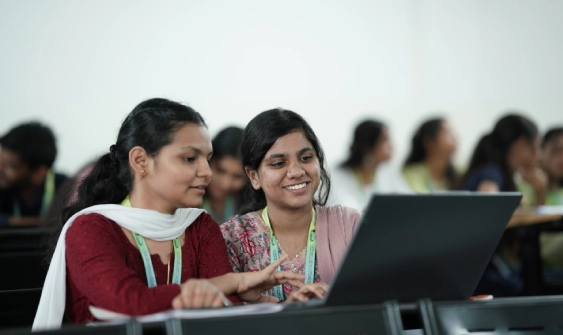
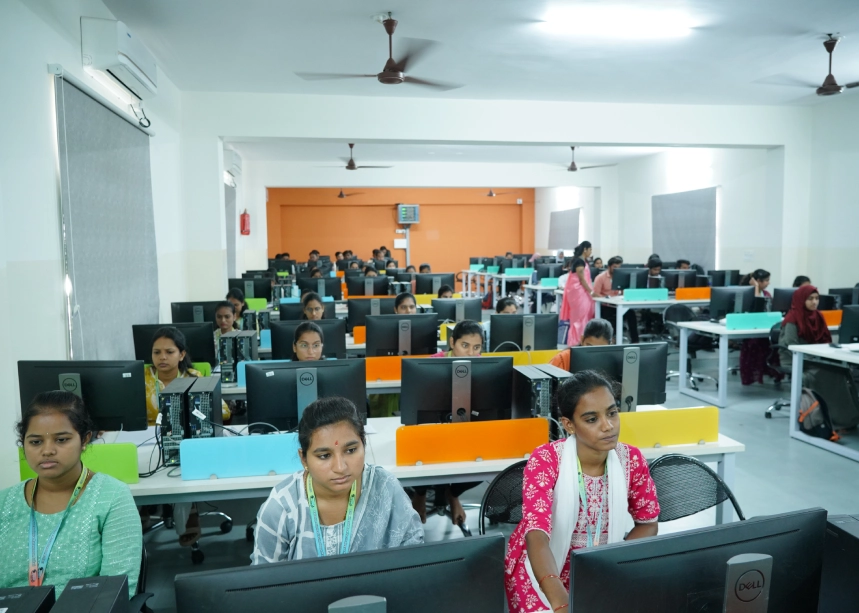
Many institutions require candidates to take entrance exams such as: Karnataka PGCET/COMED-K/Other state/national level exams depending on the institution
Programme Educational Objectives (PEOs)
PEO-1
To produce proficient post graduates ready to work with a sense of ethics, social responsibility and enabling them to work efficiently individually and also as a team
PEO-2
To contribute to the society and industry as an Engineer through deep knowledge acquired in core engineering
PEO-3
To develop new processes and implement the solutions for industrial problems.
Program outcomes (POs)
PO 1
Foundation Knowledge
Apply knowledge of mathematics, programming logic and coding fundamentals for solution architecture and problem solving.
PO 2
Problem Analysis
Identify, review, formulate and analyse problems for primarily focusing on customer requirements using critical thinking frameworks.
PO 3
Development of Solutions
Design, develop and investigate problems with as an innovative approach for solutions incorporating ESG/SDG goals.
PO 4
Modern Tool Usage
Select, adapt and apply modern computational tools such as development of algorithms with an understanding of the limitations including human biases.
PO 5
Individual and Teamwork
Function and communicate effectively as an individual or a team leader in diverse and multidisciplinary groups. Use methodologies such as agile.
PO 6
Project Management and Finance
Use the principles of project management such as scheduling, work breakdown structure and be conversant with the principles of Finance for profitable project management.
PO 7
Ethics
Commit to professional ethics in managing software projects with financial aspects. Learn to use new technologies for cyber security and insulate customers from malware
PO 8
Life-long learning
Change management skills and the ability to learn, keep up with contemporary technologies and ways of working.
Programme Specific Outcomes
PSO 1
Analyse, design and implement solutions in the field of Computer Applications to solve computational tasks and model real world problems
PSO 2
Ability to explore technological advancements in various domains, identify research gaps by providing solution to new ideas and innovations.
Program Curriculum 2023 Scheme
| Sl No | Course code | Course Name |
|---|---|---|
| 01 | 23MCA11 | Mathematical Foundation for Computer Applications |
| 02 | 23MCA12 | Operating System with UNIX |
| 03 | 23MCA13 | Data Structures and Applications |
| 04 | 23MCA14 | Software Engineering & Project Management |
| 05 | 23MCA15 | Web Technologies |
| 06 | 23MCAL16 | Data Structures - Lab |
| 07 | 23MCAL17 | Web Technologies - Lab |
| 08 | 23MCA18 | Research Methodology and IPR |
| 09 | 23MCA19 | BOS Recommended ONLINE Courses |
| 10 | 23MCA110-BC | Basics of Programming and Computer Organization (Bridge Course) |
| Sl No | Course code | Course Name |
|---|---|---|
| 01 | 23MCA21 | Database Management System |
| 02 | 23MCA22 | Object Oriented Programming with JAVA |
| 03 | 23MCA23 | Computer Networks |
| 04 | 23MCA24 | Introduction to Python |
| 05 | 23MCA25X | Professional Elective – 1 |
| 06 | 23MCA26X | Professional Elective – 2 |
| 07 | 23MCAL27 | DBMS Lab |
| 08 | 23MCAL28 | JAVA Programming Lab |
| 09 | 23MCA29 | Seminar |
Professional Elective-1 |
||
| 01 | 23MCA251 | Computer Graphics with Open GL |
| 02 | 23MCA252 | Cyber Security |
| 03 | 23MCA253 | Software Testing |
| 04 | 23MCA254 | Introduction to Data Analytics |
Professional Elective-2 |
||
| 01 | 23MCA261 | Introduction to Artificial Intelligence |
| 02 | 23MCA262 | Mobile Application Development |
| 03 | 23MCA263 | Distributed Operating System |
| 04 | 23MCA264 | Natural Language |
| Sl No | Course code | Course Name |
|---|---|---|
| 01 | 23MCA31 | Data Analytics with Python |
| 02 | 23MCA32 | Internet of Things |
| 03 | 23MCA33X | Professional Elective - 3 |
| 04 | 23MCA34X | Professional Elective - 4 |
| 05 | 23MCAP35 | Project Work Phase - 1 |
| 06 | 23MCAL36 | Data Analysis Lab |
| 07 | 23MCAL37 | IoT Lab |
| 08 | 23MCAMP38 | Mini Project |
| 09 | 23MCAINT39 | Internship |
Professional Elective-3 |
||
| 01 | 23MCA331 | Block Chain Technology |
| 02 | 23MCA332 | Big Data Analytics |
| 03 | 23MCA333 | Cloud Computing with AWS |
| 04 | 23MCA334 | NOSQL |
Professional Elective-4 |
||
| 01 | 23MCA341 | Advanced JAVA and J2EE |
| 02 | 23MCA342 | Object Oriented Modeling and Design |
| 03 | 23MCA343 | Robotic Process Automation |
| 04 | 23MCA344 | Virtual Reality |
| Sl No | Course code | Course Name | |
|---|---|---|---|
| 01 | 23MCA41X | PROFESSIONAL ELECTIVE-5 | |
| 02 | 23MCA42X | PROFESSIONAL ELECTIVE-6 | |
| 03 | 23MCAS43 | Technical Seminar | |
| 04 | 23MCAP44 | Project Work Phase - 2 | |
Professional Elective-5 |
|||
| 01 | 23MCA411 | Introduction to Data Science | |
| 02 | 23MCA412 | Deep Learning | |
| 03 | 23MCA413 | Software Project Management | |
| 04 | 23MCA414 | Software Defined Networks | |
Professional Elective-6 |
|||
| 01 | 23MCA421 | Introduction to DevOps | |
| 02 | 23MCA422 | Storage Area Networks | |
| 03 | 23MCA423 | Agile Technology | |
| 04 | 23MCA424 | UI/UX Design | |
Faculty
FAQs
The MCA program is typically a two-year course, divided into four semesters. Each semester includes a mix of core subjects, electives, and practical labs.
Candidates must have a bachelor’s degree in computer science, information technology, or a related field, with a required minimum percentage or must have studied mathematics at 10+2 level.
Yes, some institutions require candidates to take an entrance examination, such as PGCET, KMAT and Management Quota. Admission is based on entrance exam scores, academic performance, and any specific admission criteria of the institution.
Core subjects typically include Programming Languages, Data Structures, Database Management Systems, Software Engineering, Computer Networks, Artificial Intelligence, and Machine Learning, among others.
Yes, students can choose from a range of elective subjects depending on their area of interest. Electives may cover topics like Cloud Computing, Blockchain, Cybersecurity, Data Science, and Mobile Application Development.
The curriculum includes mini-projects, real-time projects, and a final-year capstone project where students apply their knowledge to solve real-world problems.
MCA graduates can pursue roles such as Software Developer, Data Scientist, System Analyst, Web Developer, IT Consultant, Database Administrator, and more in diverse industries like IT, finance, healthcare, and education.
Yes, the department has partnerships with various companies and helps students secure internships to gain practical experience and industry exposure.
The MCA department offers well-equipped computer labs, high-speed internet, multimedia classrooms, project spaces, a specialized library, and access to online databases for research.
Yes, students are encouraged to participate in research, especially in fields like Machine Learning, Artificial Intelligence, Data Analytics, and Cloud Computing. Faculty members mentor students in research projects and papers.
Yes, the department has a dedicated placement cell that assists students with job placements, interviews, and career counselling. Alumni connections and industry collaborations enhance placement opportunities.
The program is structured into core and elective subjects with lab sessions, lectures, workshops, and seminars. Practical learning, industry projects, and interactive classes are key aspects of the teaching methodology.
Yes, the department encourages student participation in tech clubs, coding competitions, hackathons, seminars, and workshops to enhance learning and skills.
You can reach the MCA department via email at girishkumar@bitm.edu.in or by phone at +919886954954. For official information, visit our website or office during working hours.
